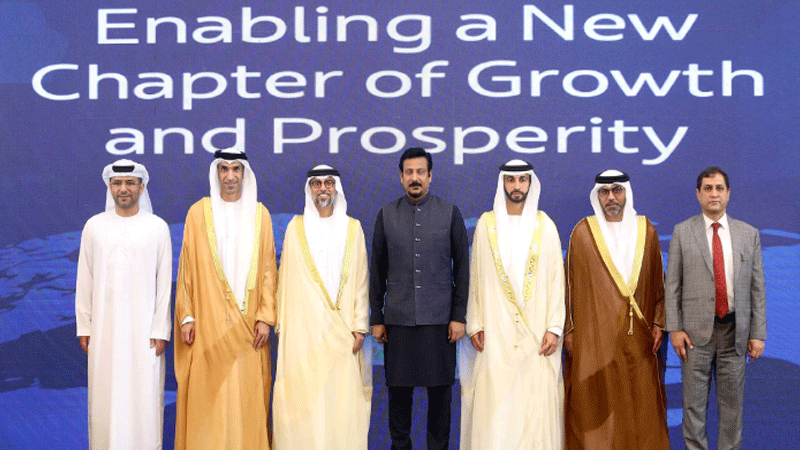AD Ports Group signs 50-year concession agreement with Karachi Port Trust for container terminal

AD Ports Group, a global leader in trade, logistics, and industry, announced the signing of a concession agreement with Karachi Port Trust (KPT), the Pakistani federal government agency that oversees the operations of the Port of Karachi.
Under the terms of the 50-year concession agreement, a Joint Venture between AD Ports Group, as a majority shareholder, and Kaheel Terminals, a UAE-based company has been formed to manage, operate and develop the Karachi Gateway Terminal Limited (KGTL), berths 6-9 at Karachi Port’s East Wharf.
The JV will undertake significant investments in infrastructure and superstructure over the next 10 years, with the bulk of it planned for 2026. The development works will include deepening of berths, extension of quay walls, and an increase in container storage area. As a result, the terminal will be able to handle Post Panamax class vessels of up to 8,500 TEUs (Twenty-Foot Equivalent Units) and container capacity will increase from 750,000 to 1 million TEUs per annum. This expansion and enhancement will further cement the Terminal and Karachi's position as a key player in the maritime industry.
The Terminal’s operations are all dollarised with no foreign exchange exposure to the Pakistani Rupee. Historically, the terminal has been generating revenue of around $55 million and EBIDTA of around $30 million annually.
This strategic agreement follows the signing in May this year of a Memorandum of Understanding, which inked both entities shared vision to drive growth, promote trade diversification, and strengthen bilateral ties between the UAE and Pakistan.
AD Ports Group has also signed three MoUs with the Government of Pakistan to establish a framework for cooperation in improving transportation infrastructure, facilitating efficient cargo movement, reducing logistics costs, and enhancing the competitiveness of Karachi Port or any other projects of mutual interest. The Group will provide technical expertise, advice, and support to the Government for the planning, design, and implementation of trade, customs and logistics infrastructure projects within Pakistan.
Rail Connectivity MoU
Under this MoU, the parties have agreed to collaborate under a bilateral framework of mutual cooperation to develop and upgrade the connectivity of Karachi Port to the railway systems.
Free Zone MoU
This MoU establishes a cooperative relationship between AD Ports and Port Qasim Authority for the development, operation, and management of industrial and/or free zone facilities in the Port Qasim area.
Digital Solutions MoU
Under this MoU, AD Ports Group and the Government of Pakistan will cooperate to develop digital trade and logistics solutions including customs digitalisation.
H.E Suhail Al Mazrouei, Minister of Energy and Infrastructure, said “We are pleased to witness the signing of this concession agreement, which signifies the UAE's continued commitment to strengthening our ties with Pakistan. This Joint Venture signifies our dedication to investing in increasing capacity and advanced infrastructure that will not only benefit trade and maritime business but will also enhance the region's connectivity and drive the objectives of both nations towards economic resilience and diversification."
H.E Dr. Thani bin Ahmed Al Zeyoudi, Minister of State for Foreign Trade, said: "This milestone agreement will bolster the terminal's capacity, further enhancing its attractiveness to international trade partners to contribute to the growth of Karachi's position as a key player in the global trade industry. AD Ports Group is not only investing in the development of the Karachi Gateway Terminal but also setting the stage for greater cooperation and mutual benefit between the UAE and Pakistan. We remain committed to our great leaders’ vision of fostering collaboration with all of our international partners and with the Government of Pakistan.”
Faisal Subzwari, Pakistan Minister for Maritime Affairs, said, “The UAE and Pakistan have a strong and long-standing relationship, which is experiencing continuous growth in the areas of trade and investment due to our leadership's commitment to further strengthen ties. The signing of this agreement underscores both our great nation’s shared vision for the development of port infrastructure and sets the stage for a prosperous global maritime ecosystem.”
Captain Mohamed Juma Al Shamisi, Managing Director and Group CEO of AD Ports Group said, "AD Ports Group is delighted to embark on this landmark partnership with the Government of Pakistan. The signing of the concession agreement with Karachi Port Trust, and the three MoUs, exemplify AD Ports Group’s strategy of investing in key maritime trade routes for the UAE, replicating our successful integrated business model in regions that offer long-term, sustainable growth prospects.”
“The concession agreement, has the potential to unlock a new chapter of growth and progress for both the UAE and Pakistan, enabling us to strengthen ties with key trading nations and leading to increased economic growth and prosperity. We foresee significant opportunities ahead, together, in line with our wise leadership’s vision, we will redefine the maritime landscape and create value for all stakeholders."
Syed Syedain Raza Zaidi, Chairman, Karachi Port Trust, said, “This landmark agreement between AD Ports Group and KPT marks a significant milestone and holds big potential for the growth and development of Karachi Port. By joining forces, we are paving the way for a thriving container terminal that will enhance efficiency, attract investment, and stimulate the economy.”
The UAE was Pakistan’s number one regional trading partner in 2021, accounting for over 40% of Pakistan's trade with Arab countries, with non-oil exports from the UAE to Pakistan valued at nearly AED 4.8 billion ($1.3 billion) in 2022 according to Pakistan’s Ministry of State for Foreign Trade. Additionally, re-exports from the UAE to Pakistan amounted to AED 10.6 billion (US$ 2.9 billion), reflecting a 7.7% growth compared to 2021.








